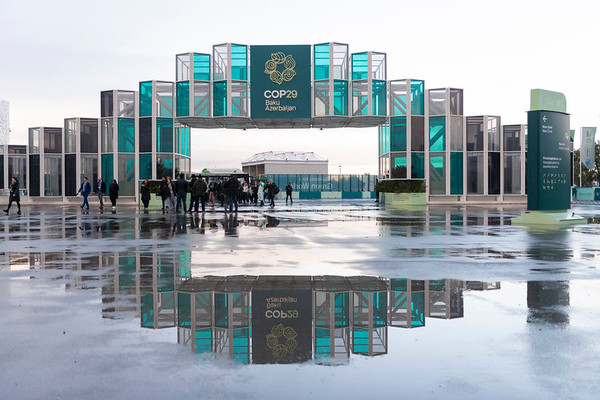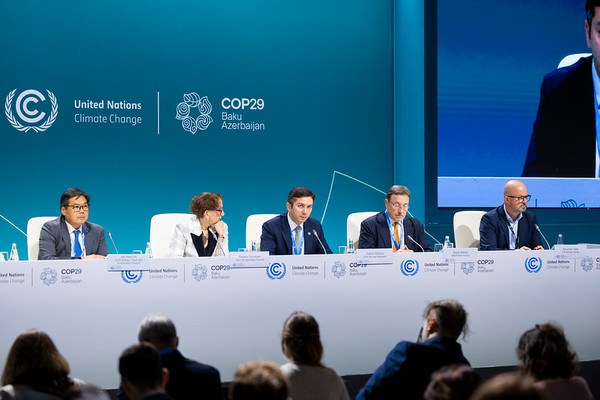COP29, climate negotiation failure avoided
New plan to finance global climate cooperation approved at COP29 in Baku. By 2035, USD 1.3 trillion per year is to be mobilised to help developing countries mitigate and adapt to climate change.
Developed countries' commitment, however, stops at 300 billion per year to be disbursed within 11 years, from public and private sources or through development banks, and inviting other newly developing countries to contribute.
After two weeks of tough negotiations, the most eagerly awaited and debated text on climate finance, on the so-called New Collective Quantified Goal (NCQG), was adopted, despite opposition from various LDCs and countries such as India that tried at the last minute to block approval.
Furious are the non-governmental organisations of the Global South who call the agreement irrelevant and disappointing. According to Harjeet Singh, Global Engagement Director of the Fossil Fuel Treaty Initiative, “"At COP29, developed nations once again coerced developing countries into accepting a financial deal woefully inadequate to address the gravity of our global climate crisis. The deal fails to provide the critical support required for developing countries to transition swiftly from fossil fuels to clean, renewable energy systems, or to prepare for the devastating impacts of the climate crisis, leaving them severely under-resourced”.
Despite a polarised geopolitical context, however, climate multilateralism will survive. The commitment to mobilise $1.3 trillion annually represents a political step forward on the part of developed countries, despite the hostile positions of nations such as Saudi Arabia and Azerbaijan itself, which has oftern undermined negotiations.

But must be noted that the overall results of COP29 indicate a difficult time for the Paris Agreement and the fight against climate change. In the text on emission reduction (Mitigation Work Programme), the reference to limiting temperature increases to within 1.5°C of pre-industrial levels disappeared, and decisions on the implementation of the Global Stocktake were postponed until next year.
Eleonora Cogo, an expert on international finance at the Italian think tank ECCO, highlighted the eccessive influence of fossil fuel interests, which prevailed at both COP29 and the G20 in Rio, blocking the necessary actions for the green transition. She also criticised the push by many nations, including Italy, towards false solutions such as gas, biofuels and nuclear, which risk blocking innovation in energy efficiency and electrification and limiting social access to the transition.
THE NEW CLIMATE FINANCE TARGET TO 2035
The global cost of mitigation and adaptation for developing countries is estimated at USD 5.1-6.8 trillion until 2030, or USD 455-584 billion per year, while the financing needs for adaptation are estimated at USD 215-387 billion per year until 2030. Thus, what is promised as a desirable target is quite in line with what economists estimate. It will, however, be a question of how to find the other trillion dollars, since developed countries have pledged 'only' $300 billion, from a wide variety of sources, public and private, bilateral and multilateral, including alternative sources' (taxes, climate-debt swaps, philanthropy). The recipients will have to be countries among those most affected by climate change but contributing the least to cumulative greenhouse gas emissions and will be able to use the resources to implement their NDCs, National Adaptation Plans (NAPs) and adaptation communications.
ART 6: IT'S TIME FOR CARBON MARKET
The last article of the Paris Agreement that had not yet been fully operational was finalised in Baku. Article 6 on on carbon markets now includes paragraph 6.2 on cooperative approaches and 6.4 on the centralised mechanism for mitigation and sustainable development. Although carbon markets will contribute only minimally to the financial targets for tackling climate change, the approval was welcomed by practitioners, despite criticism from civil society in the Global South.
Article 6.4 establishes the Paris Agreement Credit Mechanism (PACM), the first UN-supervised global market, which will be supported by the Sustainable Development Instrument (an ex-ante assessment of each new project based on the SDGs), to meet the demands of indigenous peoples and NGOs. The Clean Development Mechanism (CDM), an old carbon market instrument of the Kyoto Protocol, will be included in this market, provided they meet the new requirements. According to Edoardo Croci, Bocconi University, 'this is an important decision that will give a global price signal and will develop more collaborations between states, as well as better target the voluntary market'.
Article 6.2 legally establishes ITMOs, or projects to reduce or remove greenhouse gas emissions, transferred between countries as a cooperation mechanism. If an African government builds a wind farm that generates an annual reduction of 100,000 tonnes of CO₂ equivalent, it can sell the carbon credits to another nation, which will then count the emission reduction in its carbon budget. All ITMOs will be listed in a single registry.

REFORMING THE COPS
During COP29, the Presidency presented the 'Rio Trio' Initiative, aimed at promoting coordinated action between the three major UN Conventions adopted in Rio de Janeiro: climate change, biodiversity and combating desertification. However, a dedicated negotiating track uniting climate, biodiversity and desertification, like those already initiated in the past on agriculture, is still missing. In the days of the Baku negotiations, the Club of Rome's proposal to reform the very architecture of the negotiations was circulated. The proposal aims to transform COPs into meetings focused on the monitoring and implementation of climate and biodiversity policies, with a drastic reduction in size and greater emphasis on achieving concrete results. It is suggested that the separation between negotiating areas and stakeholders be eliminated, instead creating shared working sessions between all participants. A global summit could be held every three years to show solutions and progress, while in the intervening years negotiators would meet in Bonn to finalise already negotiated documents, avoiding lengthy debates.
The reform also envisages the introduction of a global real-time monitoring system to calculate the impacts of policies on global warming and to update the world daily on the distance to the 1.5°C target. Public lists of countries in line with the climate target would highlight progress, incentivising more ambitious actions. Priorities include phasing out fossil fuels, transforming food systems, protecting and restoring natural ecosystems, and expanding negative emissions technologies.
But this is not the only challenge: climate is solved through important work on multilateralism and global peace. We need to strengthen the idea of the international role of the United Nations and the shared ownership of sustainable development. Otherwise there is a risk of increasingly divisive negotiations and ultimately the failure of the effort to halt the climate and biodiversity crisis.
An article written by Emanuele Bompan, from Baku

